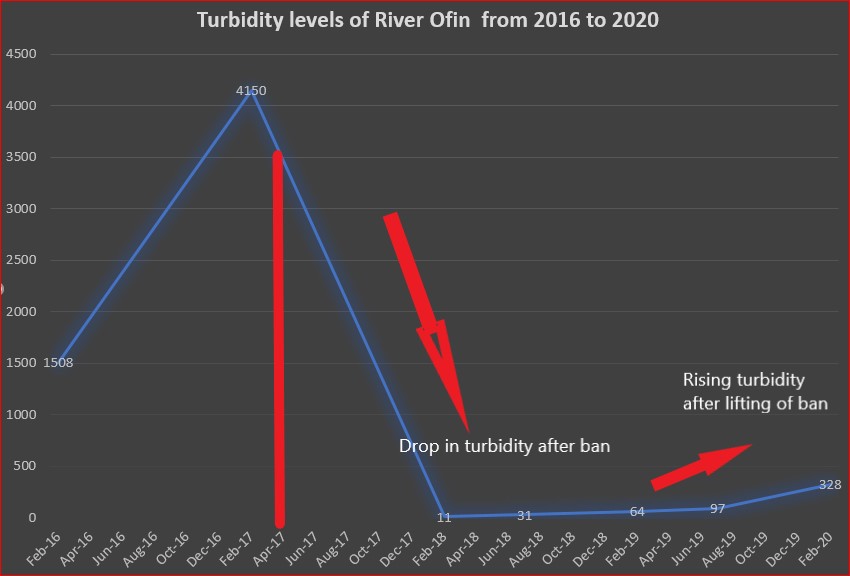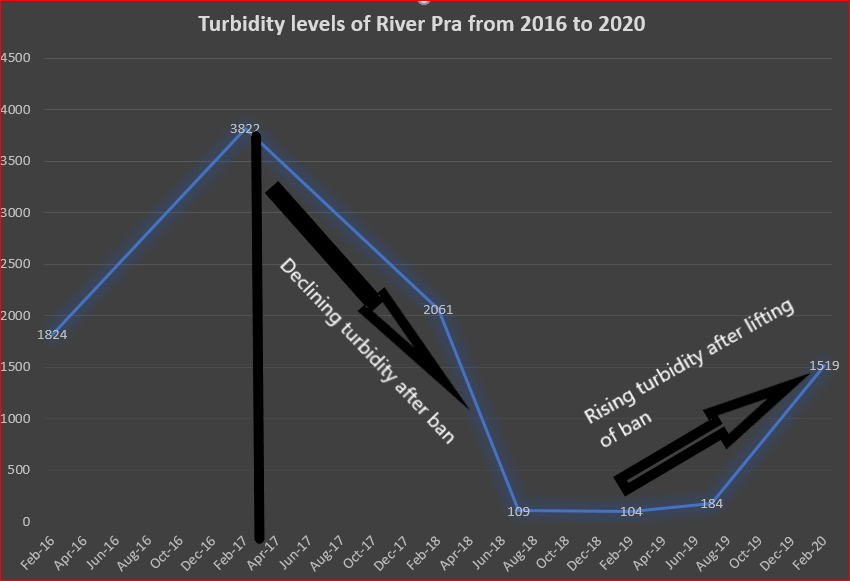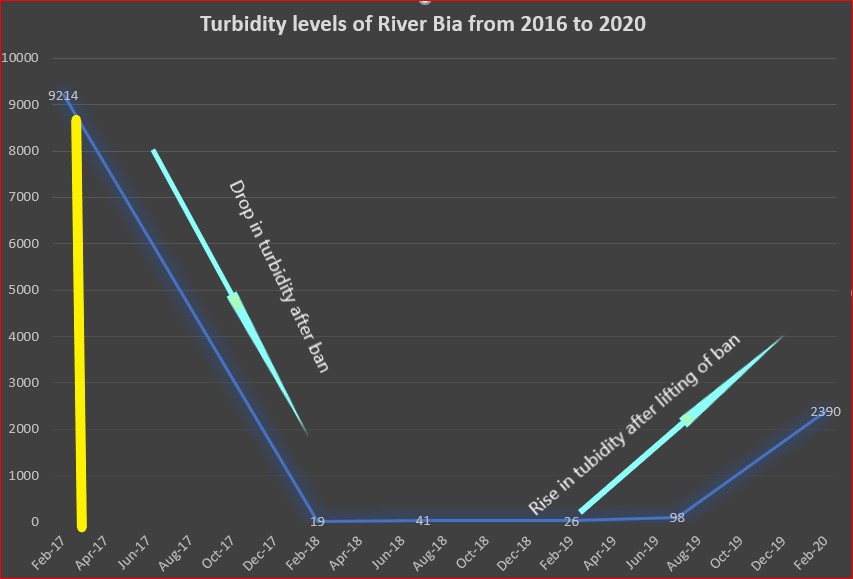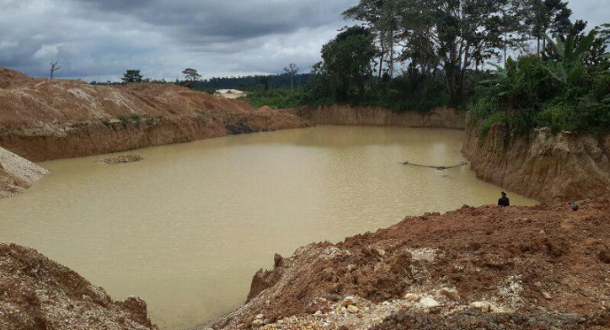Figures reveal how Ghana may run out of potable water soon due to galamsey
Potable water in Ghana could soon run out because of illegal mining, and neighbouring countries cannot assist by exporting water through canals, the Water Resources Commission (WRC) has revealed.
The increase in illegal mining, also known as galamsey, and its environmental impact in recent months after a relax in government’s efforts to tackle the menace has forced the Executive Secretary of Water Resources Commission, Ben Yaw Ampomah to conclude, “It’s not an option anymore. We don’t have the luxury of importing water.”
He pointed out, “We don’t have any excuse to comprise the quality and quantity of our water.
Mr Ampomah, a guest on JoyNews’ Newsfile, told the host, Samson Lardi Anyenini, “Water has no substitute… If you don’t have water, you don’t have life.”
Per his assessment, Cote d’ Ivoire, Burkina Faso and Togo do not have water in abundance to export to Ghana through canals and warned that the situation would leave the country in dire consequence if immediate steps were not taken to reverse the trend of ‘galamsey’ pollution.
Illegal mining: Fire your men who are failing – Dr Oduro Osae to Prez
To buttress his point, he elaborated on data collated by the commission on water quality index.
The state of a water body is normally determined using a water quality index which comprises about 10 parameters, including turbidity, nitrate content and solid in the water. When the weighted average is between 80-100 it is classified as good, 50 to 80 is fairly good, 25-50 shows pollution and below 25 shows gross pollution.
This is measured using data from 41 monitoring stations at major water bodies scattered around the country.
In 2016, before the ban on all forms of mining, 60% of the water bodies in the country had a quality index below 50. After the ban in March 2017, there was a considerable reduction in turbidity levels. However, after authorisation of small-scale mining in December 2018, the country has gone into a state of environmental destruction.
“16% overall water bodies were critical; they were below 25,” he said.
About 12% are located in the Southwestern zone, which covers Pra, Ankobra and Tano, where illegal mining is rife.
Turbidity
Turbidity measures cloudiness or dirt volumes in a water body, the lower the value the higher the quality. The standard that Ghana Water Company Limited (GWCL) requires for a water source for processing is below 5, as higher values will require more costly efforts to remove impurities. Turbidity is measured in Nephelometric Turbidity Unit (NTU).

River Offin’s turbidity in February 2016, shortly after the current government took office, was 1508 NTU. It jumped to 4150 NTU by February 2017. The ban was put in place in March 2017, and, by February 2018, turbidity had reduced drastically to 11 NTU. In July 2018 it rose to 31NTU and then to 64 NTU in February 2019. By July 2019 it had reached 97 NTU and shot up to 328 NTU in February 2020.
“We were doing well when the ban was in place,” Ampomah said.

For River Pra at Akyem Oda: turbidity in February 2016 was 1824NTU, February 2017 was 3822 NTU, February 2018 was 2061NTU, July 2018 was 109NTU, February 2019 was 104 NTU, July 2019 was 184NTU and February 2020 showed a huge jump to 1519 NTU. It reflected how the ‘galamsey’ practice had gone back to polluting the water bodies.
“When you disturb it in terms of illegal activities, then you will have the consequences as we are talking about,” Mr Ampomah lamented.

For River Bia, turbidity for February 2017 was the highest at 9214 NTU before imposing the ban. After the ban, the February 2018 turbidity recorded was 19. July 2018 was 41NTU, February 2019 was 26NTU, July 2019 was 98NTU and February 2020 an astronomical jump to 2390 NTU.
River Bia flows from upstream in Ghana into Cote d’Ivoire which serves as a source of water for some provinces in the neighbouring West African country.
The commission said it received complaints from Ivorian authorities in 2019 that Ghana was polluting their water bodies. They had to cease supply to communities that depended on the Bia river based on the high turbidity.
“They had data, and the values suggested that the activities were not from Cote d’ Ivoire. Their data were not significantly different from what we had, which showed that our activities had actually contributed significantly to the situation out there,” Mr. Ampomah noted.
He cautioned that the country needed to be conscious that “whatever activities [take place here] do not affect only us, but our neighbours” and serious consequences could attract various sanctions for violating international water protocols.
He also raised issues of the reduction in the volume of water in the country’s rivers as illegal miners dump sand during the process to wash the minerals. This, he said, placed a cost burden on authorities in dredging.
He said illegal mining had financial implications on citizens in terms of the cost GWCL had to incur to treat water for consumers.
Unmoved illegal miners keep mining by the road as ‘galamsey’ minister’s convoy passes by
He pointed out that the cost of treatment per cubic metre of treatment increased from GHC 0.026m3 in 2007 to GHC 0.152 per cubic metre (m3) in 2017. That is 219 gallons. However, this was reduced to GHC 0.135 m3 in 2018 after the ban was put in place.
The machines could also break down totally.
He, therefore, advocated a “refocus and make it [illegal mining] a national security issue”.
For his part, the Head of the Groundwater Division of the CSIR-Water Research Institute, Dr Anothony Appiah Duah, stated that mercury used by the illegal mining leached into river bodies which ended up being consumed by fish.
“Humans eat fish and the mercury build-up ends up causing health problems,” he said.
He stated that the influence of politicians was not helping the fight against illegal mining, hence the government should appoint only technical persons who had the expertise to tackle the menace.


